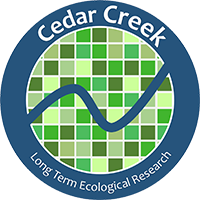Data use
Cedar Creek makes available all data supported wholly or in part from LTER funds in accordance with LTER Data Access policy. The large majority of data is Type I, and is released within two years of collection. Data is freely available, though users must create an account to access full datasets. Users agree to Cedar Creek’s data use policies, which are available when accessing data and in dataset metadata.
Additional information on Cedar Creek's data license and citation guidelines are available here.
Getting started
For researchers new to Cedar Creek, an introduction to Cedar Creek's LTER information program is available in this document. We recommend "Some Simple Guidelines for Effective Data Management" (Borer, et al.) for data management plans.
Data Submissions
All data collected with direct or indirect LTER funding must be submitted to the site information management team within two years of collection. Please use the Excel workbook below to record and submit tabular data and all metadata associated with each dataset. Non-tabluar data, or datafiles that are exceptionally large may be submitted in a compressed format (such as a zip file).
Cedar Creek Data Submission Workbook
Please contact the information management team for assistance or with any questions. Dan Bahauddin(link sends e-mail) and Susan Barrott(link sends e-mail) are available to help with this process.
Custom databases
The Cedar Creek information management team is available to assist in the creation of databases and data entry forms. These can be used on individual computers, a network of systems, or on field data collection devices.
IT Support
Most Cedar Creek IT support is provided by the University of Minnesota's Office of Information Technology. For issues with computers, printers, internet connectivity or facility phones, please call 1-HELP (612-301-4357).
File systems
All Cedar Creek data, metadata, personnel information, and publication information are stored and organized in an Oracle database. EML and text files are dynamically generated through php scripts via the Cedar Creek website. Archival text files are also generated and stored in a hierarchical directory system on a central server as a primary data archive.
Cedar Creek database servers are maintained by the University of Minnesota's Office of Information Technology (OIT). OIT seeks to provide researchers at the University of Minnesota access to high-performance computing resources and user support to facilitate successful and cutting-edge research in all disciplines, help researchers attract funding, contribute to undergraduate and graduate education, and benefit the broader community.
OIT also provides and maintains the servers which host the Cedar Creek website.
Quality assurance and quality control
QA/QC is designed into all data and sample collection protocols. Multiple levels of independent checks at the sample collection and processing level are designed to minimize error. Additional series of checks at the data processing stage are intended to eliminate incorrect data.
Data backup and migration
Data on all Cedar Creek computers are backed-up using University of Minnesota licensed software to central off-site systems. Daily, weekly, monthly, and yearly backups are accessible to users for retrieval of lost or changed files.
The Cedar Creek Oracle database and web server has full weekly backups as well as daily incremental backups. All database tables are also stored as text files to provide for the possible need to migrate data to new database or other data management systems. Additionally, all datasets, with associated metadata, are stored as text files on the web server and information management computers for long term data accessibility and flexibility for future data needs. All database tables, archive files, and information management working files are backed up annually to portable media and stored in on-site and off-site safes. Each annual backup includes all prior year backups, thus keeping all information on media compatible with current technology.
Copies of paper datasheets and metadata records are housed at Cedar Creek and off-site.
